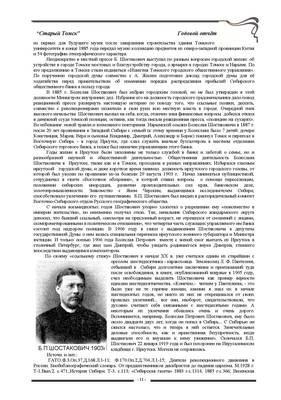Shostakovich Boleslav Petrovich
Exile in Tomsk and Narym exile. Public figure in Tomsk and Irkutsk
In Tomsk in 1866, after serving his sentence in the Peter and Paul Fortress, Boleslav Shostakovich, a native of Yekaterinburg and son of a veterinarian, found himself as a political exile, having been brought to the investigation and trial in the Ishutin-Karakozov case. He was accepted into service as a scribe in the provincial administration, and three years later began serving as an accountant in the city administration. In December 1872, he was exiled to Narym. In Narym, he studied political economy, geography, botany, accounting, and filled in the gaps in his education. He was also engaged in research of the Northern Ob region, and his wife taught the children to read and write.
In April 1877, the family returned to Tomsk. For 10 years, he worked as an accountant in the office of the Petrov and Mikhailov trading company and simultaneously took part in local city government. He was elected as a member of the Tomsk City Duma and a member of the city council, and was the initiator of many public initiatives. Shostakovich repeatedly spoke in the local press on various issues of city life: on the construction of pavements and city improvement in the city of Tomsk, on the fair in the cities of Tomsk and Narym. At his suggestion, the "News of the Tomsk City Public Administration" began to be published in Tomsk. In 1885, Boleslav Shostakovich was elected mayor, but the election was not approved by the Minister of Internal Affairs.
In 1887 he moved to Irkutsk, where he served as the manager of the local branch of the Siberian Trade Bank, was elected as a member of the Irkutsk City Duma and city council, and even briefly held the position of Irkutsk city mayor, and in 1906 he was nominated for deputy of the State Duma. B. P. Shostakovich died on January 22, 1919 and was buried in the Jerusalem Cemetery in Irkutsk. The grave has not survived.
Grandfather of the outstanding composer Dmitry Dmitrievich Shostakovich.
Documents (2)
Fund 002 / Inventory 003: Статьи / Case 141
001. Shostakovich Boleslav-Arthur. Political exile, public figure in Tomsk in 1866-1886. / V. A. Khanevich // Report of the local history club “Old Tomsk” for 2007: Tomsk region. scientific fuck them. A. S. Pushkin. - Tomsk, 2009. - pp. 9-12. - Bibliography: p. 11-12.
Biography of Boleslav Arthur Shostakovich (1845–1919), a Polish political exile and public figure in Tomsk and Irkutsk. The article covers his participation in the revolutionary movement of the 1860s, exile, activities in the Tomsk city government, contribution to education and local history in Western Siberia, attempts to organize a museum, participation in the banking sector, and publications in the Irkutsk press. His role as a representative of the “sixties” generation and an important figure in the public life of Siberia in the late 19th – early 20th centuries is emphasized.
List of persons:
- Berestov Mikhail Nikolaevich - Chairman of the Tomsk Provincial Government and Vice-Governor, patron of Shostakovich.
- Vashkevich Henryk - a Polish exile whose testimony became the reason for Shostakovich's arrest.
- Dombrowski Jarosław - Polish revolutionary, general of the Paris Commune, participant in the preparation of the uprising of 1863-1864.
- Gilles Alexander (A.) - member of the Tomsk City Duma, member of the commission for the creation of the museum.
- Ishutin Nikolai Andreevich - revolutionary, person involved in the Ishutin-Karakozov case.
- Kaznakov Alexander Pavlovich - Governor-General of Western Siberia.
- Kalistova Varvara Grigoryevna - revolutionary, wife of B. Shostakovich.
- Karakozov Dmitry Vladimirovich - a revolutionary who attempted to assassinate Alexander II.
- Makushin Petr Ivanovich - member of the Tomsk City Duma, member of the commission for the creation of the museum.
- Panteleev Lev Fedorovich - landowner, author of memoirs about Siberian exiles.
- Skolkov (name not given) is a major general and chairman of the investigative commission in Omsk.
- Tyumentsev G. - member of the Tomsk City Duma, member of the commission for the creation of the museum.
- Uspensky Pyotr is a convict whom Shostakovich met in prison.
- Chersky Yan - explorer of Siberia, acquaintance of B. Shostakovich.
- Shostakovich Boleslav Petrovich - Polish political exile, public figure in Tomsk and Irkutsk, founder of the museum, participant in the revolutionary movement.
- Shostakovich Varvara Grigorievna - wife of B. Shostakovich, active assistant in exile.
- Shostakovich Vladislav Petrovich - Boleslav's brother, a high school teacher in Tomsk.
- Shostakovich Dmitry Boleslavovich - son of Boleslav, father of composer D.D. Shostakovich.
- Shostakovich Dmitry Dmitrievich - grandson of Boleslav, an outstanding composer.
- Shostakovich Pyotr - collegiate assessor, father of B. P. Shostakovich; presumably participated in the Polish uprising of 1830-1831.
Source of the document: Report of the local history club "Old Tomsk" for 2007 - Tomsk, [2009]. Regional library named after A.S. Pushkin (elib.tomsk.ru)




Fund 002 / Inventory 003: Статьи / Case 103
001. From Nakhimov’s adjutants to Tomsk governors / V. A. Khanevich // “Territory of Concord”. - 2004. - No. 2 (4). - P. 36.
Source of images: Tomsk Regional Library named after Pushkin. Report of the local history club "Old Tomsk" for 2003
